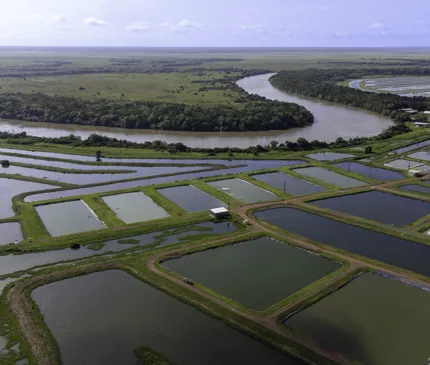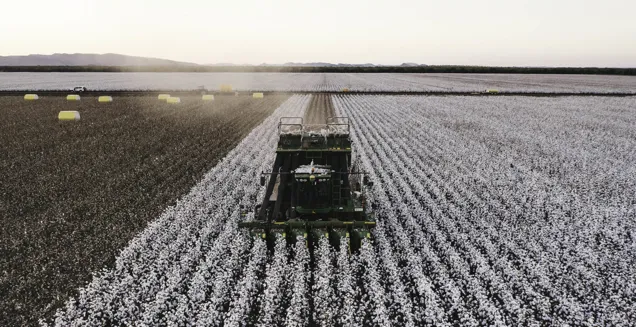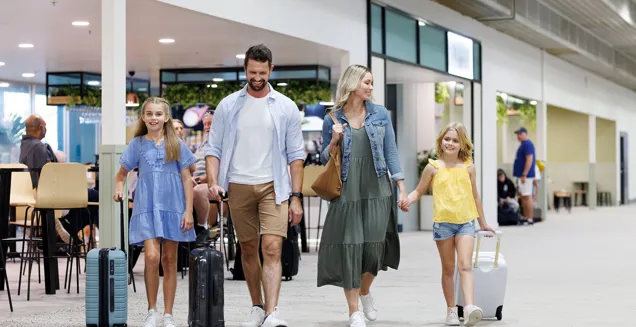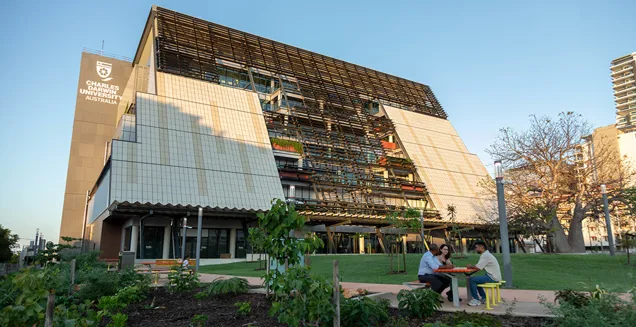Farm Expansion Project
NAIF finance assisted in the recognition of northern Australia as a leading supplier of premium saltwater farmed barramundi. (Investment Decision 3 May 2018 and 10 September 2020)
May 2018
Agriculture & Water
Humpty Doo, Northern Territory

NAIF’s investment in the Humpty Doo Barramundi Farm Expansion Project is supporting the growth of sustainable aquaculture in northern Australia, boosting barramundi production, creating local jobs, and enhancing infrastructure across the Northern Territory.
About Humpty Doo Barramundi
Humpty Doo Barramundi is a family-owned aquaculture business based on the Adelaide River in the Northern Territory. Operating since 1993, the company has grown to become Australia’s largest producer of saltwater barramundi, supplying around half of the nation’s total production. Its products are stocked by major retailers including Woolworths and Costco, and it exports to premium markets across Asia, the Middle East, and North America.
Humpty Doo Barramundi is committed to becoming Australia’s leading supplier of high-quality barramundi for both domestic and international markets.
Project Overview
NAIF’s first $7.2 million loan for pond and nursery facilities helped Humpty Doo Barramundi to significantly increase its supply of Australian-grown barramundi.
Stage two of the expansion, supported by a further loan for $24.2 million, will enable the family-run business to take advantage of increased demand for high-quality Australian seafood.
This stage will also include the construction of a hatchery at Channel Island, which is the first purpose-built commercial barramundi hatchery in the NT and will provide juvenile fish supply security.
Stage 2 of the expansion also includes new ponds and improvements to existing facilities such as the nursery, packing shed, roads and electrics, including the addition of rooftop solar.
How We Helped
We provided concessional finance with a longer loan tenor and flexible terms. This support was delivered over two separate Investment Decisions, giving Humpty Doo Barramundi the certainty to accelerate its expansion plans.
We played an important role in de-risking the project by tailoring finance to meet the needs of a regional aquaculture business and accelerating investment that would have been challenging to secure in the short term through private markets. By supporting industry recognition, we also helped position northern Australia as a leading supplier of premium saltwater-farmed barramundi.
Through this support, a major Top End aquaculture project is being expanded, strengthening supply chains, enhancing export potential, and showcasing northern Australia’s capability in premium food production.
Public Benefit
The Humpty Doo Barramundi Farm Expansion Project delivers notable economic benefits and various other public advantages.
Beyond its economic benefits, the Humpty Doo Barramundi Farm Expansion Project contributes to increased local employment, strengthens regional food security, and supports renewable energy use through the integration of rooftop solar. It also encourages knowledge sharing and collaboration with Indigenous communities, helping to preserve traditional ecological practices and cultural heritage. The project’s commitment to sustainable development fosters long-term environmental stewardship and reinforces the Northern Territory’s reputation for producing premium, responsibly farmed seafood.
This includes an expansion of production capacity to cater to the rising demand for fish, resulting in the creation of jobs during Stage 1, encompassing 13 construction positions and 7 permanent roles. Over stages 1 and 2 combined, the project is forecast to deliver 291 jobs during construction and operations.
Additionally, the project plays a pivotal role in expediting the growth of the Northern Territory's aquaculture sector by supplying fishlings and establishing potential multi-user processing capabilities in the future.
We are pleased to be able to make this next investment towards making Australia self-sufficient in producing Australia’s iconic saltwater barramundi, while creating new opportunities for our fellow Territorians. We would like to acknowledge the great work of the teams at NAIF, the ANZ, and Humpty Doo Barramundi.
Dan Richards
Humpty Doo Barramundi CEO
Related Links
Indigenous Engagement
- The Limilngan-Wulna people
Humpty Doo, situated in the Northern Territory’s Top End, lies on the traditional lands of the Limilngan-Wulna people, who have maintained deep cultural and spiritual connections to the region for thousands of years. Their country, which includes the Adelaide River, encompasses a diverse range of ecosystems such as wetlands, floodplains, billabongs, and savannah woodlands. These landscapes not only support a rich array of biodiversity but also hold profound cultural and ceremonial significance. The Limilngan-Wulna people possess extensive knowledge systems tied to seasonal cycles, traditional practices, and ongoing cultural responsibilities. They actively protect and manage country, integrating traditional ecological knowledge with contemporary land management methods. Their songlines, sacred sites, and ancestral stories reflect a strong, enduring connection to both land and water, underscoring their vital role as custodians of an ecologically and culturally important landscape in the Humpty Doo region.
Indigenous Engagement Strategy Commitments
- Commitment to strengthening relationships with First Nations stakeholders by identifying and meeting with local First Nations community groups, businesses, and training organisations, and offering opportunities for on-site engagement at Humpty Doo Barramundi (HDB).
- Support First Nations business participation by creating procurement and subcontracting opportunities for Indigenous-owned businesses, and prioritising suppliers and service providers that demonstrate a commitment to First Nations engagement.
- Promote employment and development by aiming to increase First Nations employment to 10% of the total workforce and providing tailored cultural and professional mentoring programs.
- Foster a culturally safe and inclusive workplace by engaging internal ‘Champions’, ensuring cultural safety, and exploring aquaculture mentoring partnerships with First Nations communities.
- Embed continuous improvement by reviewing existing partnerships, implementing a corrective action plan, and regularly evaluating progress against strategy targets in collaboration with First Nations communities.
Indigenous Engagement Strategy Outcomes
- In 2020 and 2021, HDB achieved 9% First Nations employment during COVID-19, exceeding its 10% target by September 2021. They partnered with Indigenous-owned Pudakul Aboriginal Cultural Tours to build cultural competency and piloted oyster trials for remote First Nations communities. Procurement totalled $1.18m with Indigenous-owned contractors, and 67 staff completed cross-cultural training.
- In late 2021 and early 2022, HDB continued engagement with Traditional Owners and Pudakul, integrating cultural learning into staff development. First Nations employment was impacted due to eased COVID-19 restrictions and cultural obligations in remote communities, which HDB respectfully supported. They advanced employment pathways through a pre-employment aquaculture program with Charles Darwin University and Industry Skills Advisory Council NT and explored opportunities with Batchelor Institute graduates.
- In 2022 and early 2023, HDB revised its Indigenous Engagement Strategy (IES), maintained partnerships with Pudakul, hosted 14 First Nations students through Clontarf and Stars school tours, and continued supporting NT Indigenous Business Network registered Indigenous businesses.
- In 2023 and 2024, First Nations employment rose to 4.5% with support from Ironbark Aboriginal Corporation. HDB continued supporting Indigenous businesses, championed Saltbush Social Enterprises, and expanded their support to First Nations aquaculture ventures across the NT and Torres Strait.
- In 2024 and 2025, HDB continued their relationship with Pudakul, supported aquaculture training including with communities, Wadeye and the Goulburn Islands to enable local operations, and engaged the National Indigenous Culinary Institute to appropriately source native ingredients for new product development.


